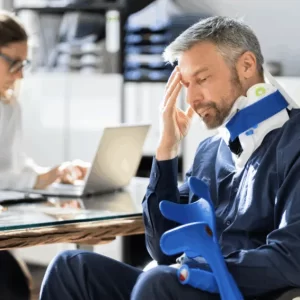If you’ve suffered an injury due to someone else’s negligence, you’re likely considering your legal options. A key piece of the puzzle for many personal injury claims? An expert witness. But what exactly is an expert witness, and why should you care?
What is an Expert Witness and Why You Need One in Your Personal Injury Claim?
Simply put, an expert witness is someone with specialized knowledge, skills, education, or experience who can offer their opinion on specific aspects of your case. Unlike a regular witness who testifies about what they saw or heard, an expert witness provides insight based on their expertise.
Think of it this way: you might know you were hurt in a car crash, but an accident reconstruction expert can explain why the crash happened, who was at fault, and even the forces involved. This kind of detailed, professional opinion can be the difference between winning and losing your claim.
For instance, imagine a case where someone slipped and fell in a grocery store. A standard witness could say the floor was wet. An expert witness, perhaps a safety engineer, could testify that the store’s floor cleaning procedures didn’t meet industry standards, causing the dangerous condition.
How an Expert Witness Strengthens Your Personal Injury Claim
Expert witnesses bring more to the table than just opinions. They can:
- Explain Complex Issues: Medical records, accident reports, and engineering analyses can be confusing. Experts translate this jargon into plain English for the judge and jury.
- Establish Causation: This is crucial. An expert can link the defendant’s actions (or inaction) directly to your injury. For example, a doctor can testify that a car accident caused your back injury, not a pre-existing condition.
- Bolster Your Credibility: Having a respected expert on your side shows the court that you’re serious about your claim and have a solid foundation for it.
- Counter the Opposition’s Arguments: Expect the other side to have their own experts. Your expert can challenge their opinions, highlight weaknesses in their reasoning, and present alternative explanations.
- Increase Settlement Value: A strong expert opinion can significantly increase the value of your claim. Knowing you have a credible expert willing to testify can pressure the defendant to offer a fair settlement.
Successful cases often hinge on expert testimony. Take, for example, the product liability claims against Johnson & Johnson regarding talc powder and ovarian cancer. Epidemiologists and oncologists testified about the link between talc exposure and cancer, playing a pivotal role in many plaintiffs winning substantial settlements.
Types of Expert Witnesses: Beyond the Obvious
While medical and accident reconstruction experts are common, don’t limit your thinking. Depending on the specifics of your injury, other types of experts can be beneficial:
- Economists: Calculate lost wages, future medical expenses, and diminished earning capacity.
- Vocational Rehabilitation Specialists: Assess your ability to return to work and determine alternative career options.
- Human Factors Experts: Evaluate how human behavior contributed to an accident (e.g., driver distraction, poor signage).
- Engineers: Analyze product defects, structural failures, or safety hazards.
Common Types of Expert Witnesses in Personal Injury Claims
Here’s a closer look at some frequently used expert witnesses:
- Accident Reconstruction Experts: These individuals analyze the details of a motor vehicle accident, including the vehicles’ speeds, positions, and the forces involved. They can determine the cause of the accident and who was at fault.
- Medical Experts: As mentioned previously, medical experts review your medical records, provide opinions on the nature and extent of your injuries, and offer insights into your prognosis.
- Forensic Experts: These specialists can analyze evidence from the scene of an accident or crime to help reconstruct what happened.
- Financial Experts: They offer detailed analysis to offer an objective, third-party assessment of any financial losses, future losses, and any impacts on any business.
The Critical Role of a Medical Expert Witness in Personal Injury Claims
In many injury claims, a medical expert witness is non-negotiable. They can:
- Establish the Severity of Your Injuries: They can provide a clear picture of your diagnosis, treatment, and long-term prognosis.
- Connect Your Injuries to the Accident: They can testify that the car crash (or slip and fall, etc.) directly caused your specific injuries.
- Explain Complex Medical Procedures: If your treatment involves complex surgeries or therapies, the expert can explain these to the jury in understandable terms.
- Assess Future Medical Needs: They can project the costs of future treatment, medications, and rehabilitation.
Imagine you’re claiming a traumatic brain injury (TBI) after a car accident. A neurologist can testify about the specific type of TBI you sustained, the impact on your cognitive function, and the long-term care you’ll require. Without this expert testimony, it’s much harder to prove the full extent of your damages.
How to Start Finding an Expert Witness for My Claim
Finding the right expert is crucial. Here’s where to begin:
- Consult with Your Attorney: Your attorney likely has a network of trusted experts they’ve worked with before. This is the best first step.
- Online Databases: Several online directories specialize in connecting attorneys with expert witnesses. These resources allow you to search by specialty and location.
- Professional Organizations: Many professions have associations or societies that maintain member directories.
- University Contacts: Professors and researchers at universities often possess specialized knowledge and can serve as expert witnesses.
- Check Credentials: Verify the expert’s qualifications, experience, and reputation. Look for board certifications, publications, and prior experience testifying in court.
- Evaluate Communication Skills: An expert can be brilliant, but if they can’t explain their opinions clearly and concisely, they won’t be effective.
Important Considerations: The Daubert Standard
U.S. federal courts and many state courts follow the Daubert Standard for admissibility of expert testimony. This standard, established in Daubert v. Merrell Dow Pharmaceuticals, requires judges to assess the reliability and relevance of scientific evidence before allowing it to be presented in court. Factors considered include:
- Whether the expert’s technique or theory can be tested.
- Whether it has been subjected to peer review and publication.
- The known or potential error rate of the technique or theory.
- Whether it is generally accepted in the relevant scientific community.
Your attorney will ensure that any expert witness you hire meets these standards to avoid having their testimony excluded.
Strategies for Cross-Examining Opposing Expert Witnesses
If you’re in a courtroom situation, your attorney can do the following to cross-examine opposing expert witnesses:
- Highlight Weaknesses in Methodology: Scrutinize the data, methods, and assumptions used by the opposing expert.
- Challenge Qualifications: Question the expert’s credentials, experience, and any potential biases.
- Expose Conflicting Opinions: Point out any inconsistencies between the expert’s testimony and prior statements or publications.
- Present Alternative Explanations: Offer alternative interpretations of the data that support your case.
Clear and concise communication by expert witnesses is essential for jury understanding.
Investing in Your Claim: The Cost of an Expert Witness
Expert witnesses aren’t free. They charge fees for their time, including reviewing records, conducting analyses, preparing reports, and testifying in court. The cost can vary widely depending on the expert’s field, experience, and the complexity of the case.
Here’s a general idea:
- Initial Consultation: $200 – $500 per hour
- Record Review and Report Preparation: $200 – $750 per hour
- Deposition Testimony: $500 – $2,000 per hour
- Trial Testimony: $1,000 – $5,000 per day
While these costs can seem daunting, think of it as an investment in your case. A strong expert witness can significantly increase your chances of a successful outcome, leading to a larger settlement or jury award. Your attorney can help you evaluate the potential return on investment and develop a strategy for managing expert witness costs.







I truly prize your piece of work, Great post.